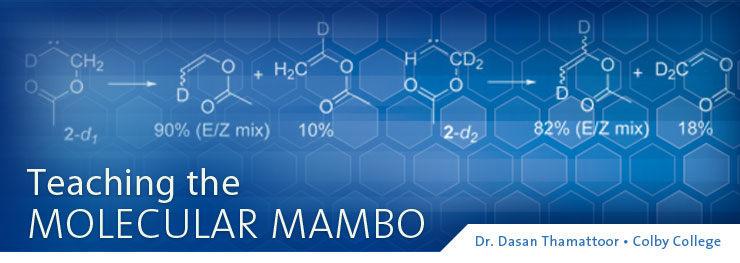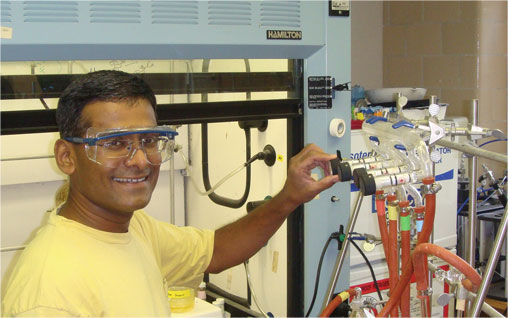


| Photochemical Generation of Carbenes |
Professor Dasan Thamattoor has always been intrigued with how one material gets converted into another. Why does one bond break here and another form there? "I like the nuances of this very sophisticated, carefully choreographed molecular dance," he says. Dr. Thamattoor is himself a choreographer, teaching undergraduate students the basic steps to these molecular movements. He helps lead the chemistry program at Colby College, a small, four-year liberal arts college in Waterville, Maine.
He and his students investigate a species known as reactive intermediates, the unstable compounds formed during the intermediate stages of a chemical reaction. These substances have a very brief existence. "In fact," says Thamattoor, "they have such a short lifetime, it's measured in microseconds and nanoseconds. They're considered fleeting intermediates." The team at Colby studies a particular type of intermediate, carbenes, which they generate by using photochemical precursors. Essentially, they induce a reaction, which involves decomposing appropriate materials by shining ultraviolet light on them. According to Thamattoor, some of these carbenes have been calculated and modeled, but never really generated experimentally, in a laboratory. His students have published papers on this topic and have presented work at international conferences and ACS national meetings.

Scheme taken from Dr. Thamattoor's Mechanistic Study of beta-Acetoxycarbene Rearrangement
Thamattoor considers the chemistry program a tremendous exercise, one in which undergraduates are given a thorough schooling in the fundamentals of being a chemist. The goal is to train competent, science-literate students who can design and implement their own experiments, interpret the results, and collaborate with other scientists to publish their work.
Naturally, working with undergrads is quite different from working with grad students, a difference that Thamattoor prefers. "They have this awful habit of graduating every four years," he jokes. "But it's been a fun ride because they come up with very creative ideas that I might not have considered. What they lack in experience, they more than make up for with their sheer intellectual ability, work ethic, and enthusiasm."
To read more about Dr. Thamattoor's research, click here.

Dr. Thamattoor in his laboratory